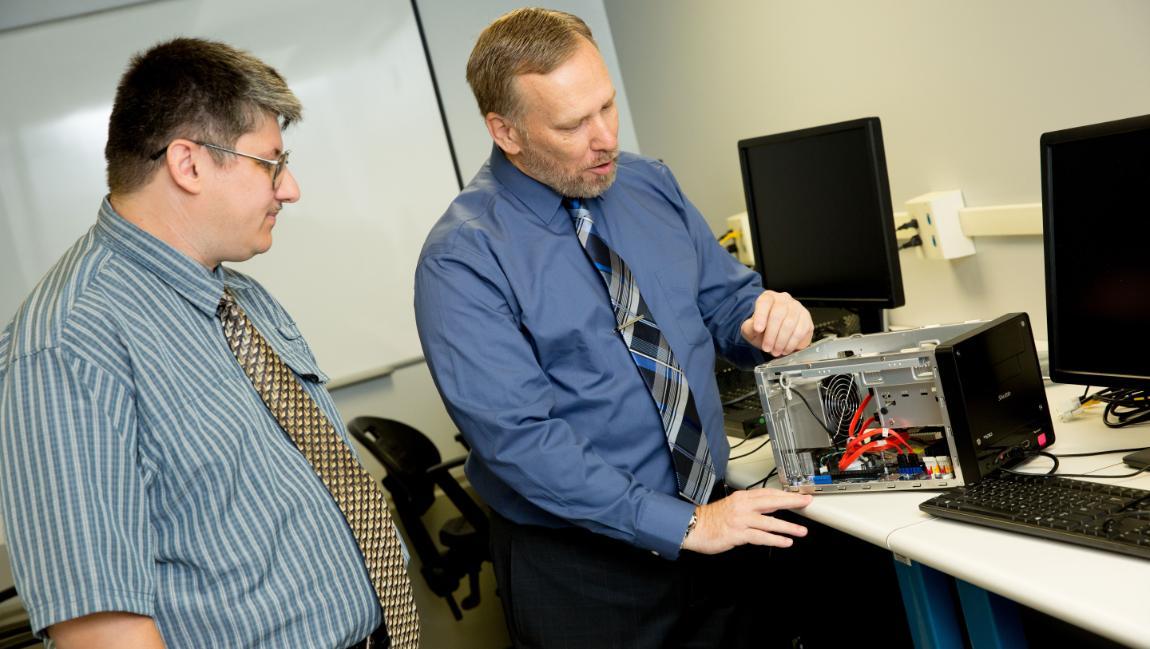When Dr. Darrell Carpenter and Dr. Robert Marmorstein sat down to assess the ways the cyber security and computer science programs at Longwood could collaborate more, they decided they needed to do some rewiring—literally.
The two programs are natural complements—and each in a field where there is an intense need for highly skilled graduates to meet growing job demand. Recognizing this, the duo set out to find ways to prioritize marketability for graduates.
We want them to go out with the best skills they can have and compete in the rapidly growing cyber job market.
Dr. Darrell Carpenter, Assistant Professor, Information Systems and Cyber Security
“We want them to go out with the best skills they can have and compete in the rapidly growing cyber job market,” said Carpenter, director of the Center for Cyber Security. “We both feel the best thing for our students is to have a combination of a major and a minor that positions them well for a wide variety of jobs.”
The first change: opening up and marketing the cyber security, forensics and policy concentration to computer science majors who hadn’t considered the career implications of having both sets of important skills.
“The demand is so high right now, you don’t have to have the cyber security credential to get the job, but it really helps,” said Marmorstein, associate professor of computer science. “There’s a huge need in the job market.”
Cyber security education is a top priority in Virginia and the demand for highly skilled workers in related fields greatly exceeds the supply in the commonwealth.
Gov. Terry McAuliffe signed legislation making computer science a core curriculum requirement for every school in Virginia, from kindergarten through high school. He regularly notes that the state has an estimated 36,000 cyber jobs open and the starting annual salary is $88,000.
“We either fill these jobs or they go to other states,” McAuliffe, who views cyber jobs as a key component of the new Virginia economy, said in July.
Dr. David Shoenthal, chair of the mathematics and computer science department, and Dr. Bennie Waller, chair of accounting, economics, finance, real estate and information systems and cyber security, were also instrumental in the push for increased coordination between the programs.
The ongoing outreach and increased collaboration, which began last year, are yielding noteworthy results. Carpenter said he has noticed a significant uptick in computer science majors declaring a minor in cyber security. Some revisions were also made in the computer science program, part of the Cook-Cole College of Arts and Sciences, so that it is a more appealing minor for students studying cyber security.
“It gives them mathematical and algorithm skills that they wouldn’t have with just the pure business degree,” Marmorstein noted. “When they get hired, it enables them to be promoted more quickly.”
The collaboration supports a key goal of a statewide business-higher education partnership, Growth4VA, which focuses in part on promoting Virginia as a top state for talent. Bolstered with these more marketable skills, Longwood computer science and cyber security graduates will enter the workforce as some of the most talented new professionals in the field.
The opportunity to collaborate across colleges and disciplines became immediately apparent to Carpenter when he arrived in 2016 and reached out to Marmorstein—but making it work required a cultural shift in how members of each program view their counterparts.
“I always tell people Longwood is unique because at most places computer science people think that business is where you go if you can’t do computer science, and business people think that computer science is nothing but stuffed shirts,” Marmorstein said. “It really is pretty remarkable that we are breaking down those stereotypes and finding ways we can collaborate so that it benefits both programs.”
Longwood’s Cyber Security Club is another area where the synergy between the two departments is evident. Marmorstein and Carpenter serve as faculty advisers for the club, which has its own dedicated server and access to a wide variety of devices used to practice hacking websites and troubleshooting malware.
“Those are the kind of things that get students engaged and inquisitive,” Marmorstein said.
The club became active last year, and members are currently preparing for the Virginia Cyber Cup competition in February. Longwood was one of 13 teams from across Virginia to participate in the first-ever statewide collegiate cyber security competition in February 2017. The competition opened the door to valuable internships for some students.
Longwood cyber security and cyber forensics students have interned at organizations such as Northrup Grumman, the FBI, BAE Systems and Carnegie Mellon University.
Carpenter and Marmorstein are still discussing further opportunities for cross-pollination between the programs, including through the new core curriculum being implemented next fall. They are also pooling resources to compete for federal grants together.
“I’m very optimistic about the changes making it easier for students to complete both programs,” said Carpenter. “It’s good for both programs.”



Leave a Comment